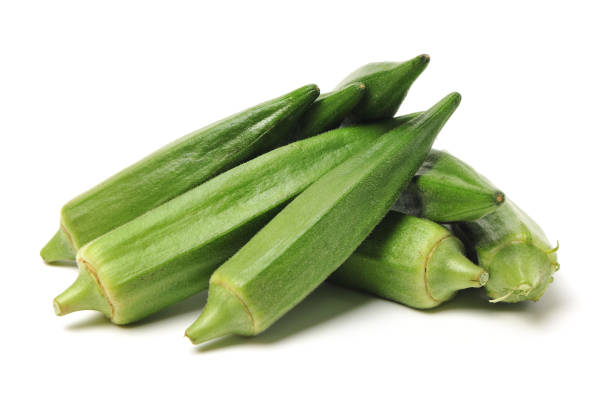Top 5 Health Benefits of Okra
Okra is a blooming plant whose seed pods are delicious. It is grown in warm, tropical settings such as those found in Africa and South Asia. Okra, while ... read more...technically a fruit, is commonly used in cooking as a vegetable. It's a common ingredient in Southern American cooking and favorite addition to gumbo. However, it might have a slimy texture that some people dislike. Though it is not a popular vegetable, okra is high in nutrients. Let's look at the finest okra health advantages.
-
Okra boasts an impressive nutrient profile. One cup (100 grams) of raw okra contains:
- Calories: 33
- Carbs: 7 grams
- Protein: 2 grams
- Fat: 0 grams
- Fiber: 3 grams
- Magnesium: 14% of the Daily Value (DV)
- Folate: 15% of the DV
- Vitamin A: 14% of the DV
- Vitamin C: 26% of the DV
- Vitamin K: 26% of the DV
- Vitamin B6: 14% of the DV
Okra is a good source of vitamins C and K1. Vitamin C is a water-soluble nutrient that aids in immunological function, whereas vitamin K1 is a fat-soluble vitamin that aids in blood clotting. Okra is also low in calories and carbohydrates, and it includes some protein and fiber. Because many fruits and vegetables lack protein, okra stands out. Protein consumption has been linked to weight loss, blood sugar regulation, bone structure, and muscle mass.

Rich in nutrients 
Rich in nutrients -
Okra is high in antioxidants, which are good for your health. Antioxidants are dietary ingredients that protect the body from dangerous chemicals known as free radicals. Polyphenols, including flavonoids and isoquercetin, as well as vitamins A and C, are the principal antioxidants found in okra. According to research, consuming a polyphenol-rich diet may boost heart health by decreasing the risk of blood clots and oxidative damage.
Polyphenols may also be beneficial to brain health because of their unique capacity to penetrate the brain and protect against inflammation. These defensive systems may help protect your brain from aging symptoms while also improving cognition, learning, and memory. Okra is high in antioxidants, which may lower your chance of developing serious diseases, decrease inflammation, and improve your general health. It is very high in polyphenols, which may benefit heart and brain health.

Contains beneficial antioxidants 
Contains beneficial antioxidants -
High cholesterol levels are linked to an increased risk of heart disease. Okra contains mucilage, a thick gel-like material that can attach to cholesterol during digestion, causing it to be expelled with feces rather than absorbed. In one 8-week trial, mice were randomly separated into three groups and fed a high-fat diet with 1% or 2% okra powder or a high-fat diet without okra powder.
The mice on the okra diet had lower overall blood cholesterol levels and excreted more cholesterol in their feces than the control group. Okra's polyphenol concentration is another potential cardiac benefit. A 4-year study of 1,100 adults found that those who ate a polyphenol-rich diet had fewer inflammatory markers associated with heart disease.

May lower heart disease risk 
May lower heart disease risk -
Okra's seeds and peel contain high levels of antioxidants, which can benefit persons with type 2 diabetes. A recent study published in the Journal of Pharmacy and Bioallied Sciences investigated the green sticky vegetable's antidiabetic and antihyperlipidemic characteristics. Diabetic rats were given the powdered form for 14 to 28 days and demonstrated better lipid profiles at the end of the experiments.
Furthermore, the health advantages of okra water have been linked to improved blood glucose control. According to research published in Natural Product Communications, drinking water flavored with roasted okra seeds is a typical natural cure for diabetes in Turkey.

Aid in Diabetes Management 
Aid in Diabetes Management -
Maintaining good blood sugar levels is critical to overall health. According to animal studies, eating okra or okra extract may help lower blood sugar levels. In one research, rats fed liquid sugar and purified okra had lower blood sugar increases than control animals. According to the researchers, the okra reduced sugar absorption in the digestive tract, resulting in a more steady blood sugar response. However, okra may interact with metformin, a commonly used diabetic medicine. As a result, eating okra is not advised for patients taking this medication.
Shanghai University of Traditional Chinese Medicine researchers discovered evidence that it may reduce overall cholesterol levels. The obese mice were given an ethanol extract of okra as part of the investigation. The nutrients in the solution, such as isoquercitrin and quercetin, helped lower blood glucose, insulin, and total cholesterol levels. This vegetable is very high in fiber, with 1 cup providing 3.2 g of dietary fiber. Dietary fiber-rich meals, according to the American Heart Association, can decrease harmful cholesterol levels.

May lower blood sugar and cholesterol levels 
May lower blood sugar and cholesterol levels


























